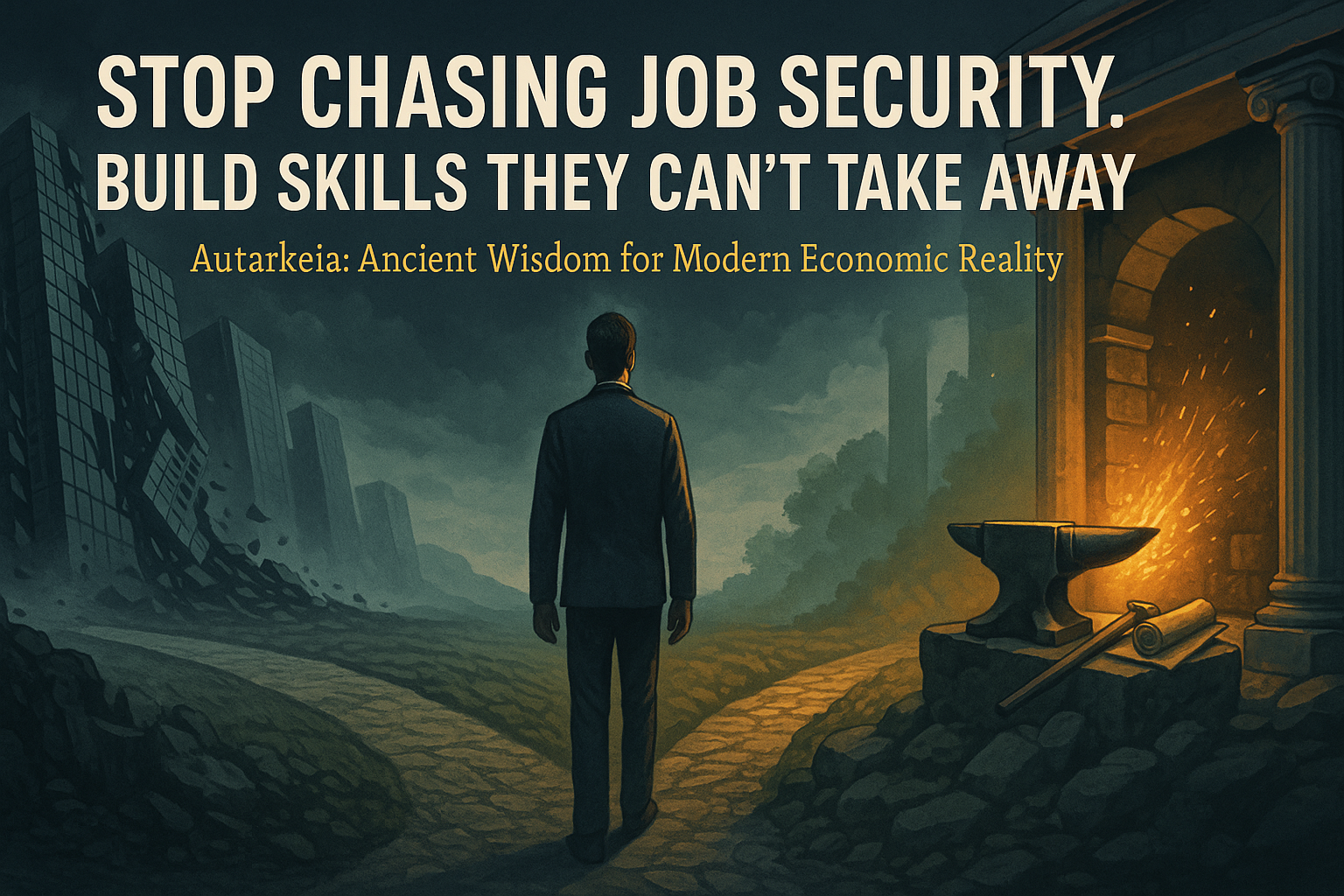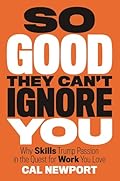
Stop Chasing Job Security. Build Skills They Can't Take Away.
By Derek Neighbors on November 7, 2025
I had to lay off over 200 people in a single day.
Not because they weren’t performing. Not because they weren’t talented. Not because they hadn’t given everything to the company.
Because regulatory and political shifts destroyed the market we served. The business model that worked for years stopped working overnight. No amount of excellence or loyalty could change that.
Watching how that impacted people opened my eyes to something most professionals don’t want to see: the security you’ve been building your career around doesn’t exist.
The ones who believed most deeply in “job security” were destroyed by it. Years of loyalty, accumulated tenure, internal expertise, none of it mattered. They’d built their entire professional identity around being valuable to one organization. When that organization couldn’t keep them, they had nothing to stand on.
And this wasn’t unique to us. Look at the last two years. Meta laid off 11,000+ people. Google cut 12,000+. Amazon eliminated 27,000+ positions. Microsoft let go of 10,000+. These weren’t struggling companies trimming dead weight. These were tech giants cutting high performers because market conditions shifted.
If you’re betting on institutional security, you’re betting on something that never existed in the first place.
The promise was simple: work hard, be loyal, stay secure. But that contract is broken. What looked like stability was just temporary alignment of interests. When interests shift, and they always do eventually, your security evaporates regardless of your performance.
There are two ways to approach security in this reality. Most people are still operating on the first while pretending they understand the second is the future.
The Two Paths
Path A: Institutional Belonging
Security through association with a stable organization. Your value comes from your position and tenure. Protection comes from being inside the system. You believe: “If I’m valuable to them, I’m secure.”
Path B: Internal Capability
Security through skills no one can take away. Your value comes from what you can independently create. Protection comes from being able to operate anywhere. You know: “If I’m capable, I’m secure.”
The core difference is simple but devastating: Path A means your security depends on someone else’s decisions. Path B means your security depends on your capabilities.
Most people still choose Path A. Not because it’s better. Because it’s comfortable. Until it isn’t.
The Institutional Belonging Model
Here’s how it works: you build your career within an organization. You accumulate tenure, advance through positions, develop internal relationships. Security feels real because the paycheck is predictable. Your identity becomes tied to where you work. “I’m a Senior Director at X” becomes who you are.
But there are hidden costs nobody talks about.
Your capability atrophies. Internal processes replace transferable skills. You become an expert at navigating their specific system, not at creating value anywhere. Organizational knowledge replaces market value. You think you’re building expertise. You’re actually building dependency.
The golden handcuffs tighten. Benefits lock you in: health insurance, 401k matching, RSUs that vest over time. Lifestyle inflation matches your institutional income. Exit costs increase every year. What felt comfortable starts feeling like cage bars, but you’re too invested to leave.
Your identity becomes fragile. When your worth is tied to your position, losing that position feels like losing yourself. I watched this happen with the people I laid off. The ones who identified most strongly with their titles took years to rebuild their sense of worth. Some never fully recovered.
You mistake activity for control. You believe performance equals security. Work harder, deliver better results, prove your value. But your fate is determined by market forces, board decisions, political shifts, variables you can’t control. Excellence is necessary but not sufficient. You’re betting on things outside your control and calling it security.
When the layoff comes, and it often does, you discover the brutal truth: your skills are organization-specific. Your network is behind the walls you just left. Your confidence was borrowed from your title. You’re starting over, older and more expensive, with expertise that doesn’t transfer.
The Internal Capability Model
This path looks different from the start. You build skills that create value anywhere. You develop portable expertise. You invest in capabilities over credentials. Your security comes from what you can do, not where you are.
But it requires upfront costs most people won’t pay.
Constant learning is mandatory. You can’t coast on tenure or internal knowledge. Excellence is rented, not owned. You must stay current with market-relevant skills. This means investing time and money in development when you’re already tired. It means being a perpetual beginner in new domains. It’s uncomfortable as hell.
Income gets volatile. You might sacrifice short-term institutional stability. Initial capability investment periods come with lower returns. Building skills takes time to monetize. The trajectory is less predictable than climbing an org chart.
Your identity is your responsibility. Your value proposition is your problem to define. No title to hide behind. No institutional affiliation to borrow credibility from. You must continuously prove your worth. Nobody else will do this work for you.
Relationships require active investment. You must build a network beyond a single institution. Maintain connections across organizations. Invest in community, not just company. This takes more energy than letting your employer provide your professional social life.
But the long-term benefits change everything.
You develop genuine security, skills that work anywhere. The ability to create value independently. Options when institutions shift. Confidence that comes from capability, not position.
You gain real freedom. You’re not locked in by benefits or tenure. You can move toward better opportunities. You negotiate from a position of strength. You have economic agency.
Your identity becomes resilient. Your worth comes from what you can do. Losing a job doesn’t mean losing yourself. Your capability outlasts any position. Your career becomes antifragile, it gets stronger through disruption, not weaker.
Autarkeia: The Ancient Answer
The Greeks had a word for this: autarkeia. Self-sufficiency.
Not isolation. Not independence from all support. But having within yourself everything necessary for eudaimonia, human flourishing. The ancient concept meant the capacity for virtue and excellence that doesn’t depend on external validation, position, or circumstances. Your worth isn’t borrowed. It’s built.
In career terms, autarkeia translates to building capabilities that enable you to create value regardless of institutional affiliation. External circumstances change. Markets shift. Organizations restructure. But what you’ve built inside yourself, your skills, your character, your capacity, travels with you everywhere.
The institutional model is what the Greeks would call heteronomy, being ruled by others. Your security depends on their decisions. It’s fragile. It breaks when external conditions change. The confidence it provides is false because you never actually had the control you believed you had.
The capability model is autonomy, self-governing. Your security depends on your capabilities. It’s antifragile. It gets stronger through challenge and change. The confidence is earned because you know what you can create regardless of circumstances.
Marcus Aurelius understood this: “You have power over your mind, not outside events. Realize this, and you will find strength.”
Security comes from internal capacity, not external position. Build what can’t be taken: skills, character, wisdom, the ability to create value anywhere. This is what it means to keep your promises to yourself.
The choice is simple but most people can’t see it clearly: Are you building career security that depends on someone else’s continued good fortune and benevolence? Or are you building capability security that travels with you anywhere?
Building Real Security
So how do you build autarkeia in practice?
Here’s how Stoic principles translate to practical action in modern careers:
Audit your skills honestly. Which of your current skills create value outside your organization? Which are only valuable inside your company’s specific context? Where are you building real capability versus institutional knowledge?
Ask brutal questions: If I left today, what could I do tomorrow that someone would pay for? Are my skills current with market standards or just my company’s standards? Am I building expertise or just learning to navigate bureaucracy?
Invest in market-relevant capability. Priority order matters: skills that create measurable value across industries. Emerging capabilities before they’re saturated, AI fluency right now, for example. Deep expertise in fundamentals that don’t change. The combination of technical and human skills that are hard to replicate.
A simple allocation: 70% of your development time on current role excellence. You still need to perform. 20% on adjacent skill development, expanding your capability. 10% on future-focused learning, staying ahead of the curve.
Build external proof. Don’t hide your capability inside your company. Side projects that demonstrate skill. Public work, writing, teaching, speaking. A portfolio of solved problems. A network that knows what you can do.
Shift from credentials to capability. Not “I work at X” but “I’ve solved Y problem in Z ways.” Not your title but your demonstrable skill. Not your tenure but your track record of results.
Create financial runway. Build an emergency fund that enables learning periods. Reduce lifestyle inflation to match variable income potential. Develop financial flexibility that lets you pursue opportunities. Create buffer that lets you leave bad situations without panic.
This isn’t deprivation. It’s strategic resource allocation. Investing in yourself versus consuming status. Building margin that creates freedom.
Develop antifragile structure. Multiple value streams: primary income that funds capability investment. Secondary skills that provide options. A network that creates opportunities. Reputation that precedes you.
Stress-test regularly: “If I lost this job today, what would I do?” “Can I create value outside this organization?” “Are my skills getting stronger or more organization-specific?”
The Hard Truth
Path A feels safer in the short term. Predictable paycheck. Clear identity. Less daily discomfort. Illusion of control.
But it’s fragile as hell. One market shift, one policy change, one board decision, and years of “security” evaporate overnight. You discover too late that your skills were organization-specific. You’re starting over at 45 with a resume that says “I was good at their system.” Nobody needs that expertise.
Path B is uncomfortable in the short term. Constant learning. Less predictability. More personal responsibility. Identity work required daily.
But it’s antifragile. Market changes make you more valuable because you adapt. Organizational shifts don’t destroy you because you have options. Your capability compounds over time. Age becomes an advantage, deep expertise combined with broad capability is rare and valuable.
The brutal question: Are you building security or borrowing it?
Final Thoughts
The people I had to lay off, the ones who recovered fastest weren’t the ones with the best titles or longest tenure.
They were the ones who’d been building capability all along. The ones who had skills that traveled. The ones who knew they could create value anywhere. The ones who understood autarkeia without knowing the word.
They lost a job, not their capacity to create value. The institutional security was always temporary. The capability security isn’t permanent either, but it travels with you to the next opportunity. It’s not that you can’t be disrupted. It’s that you can rebuild faster.
The ones still struggling two years later? They’re discovering their “expertise” was organization-specific. Their confidence was borrowed from their title. Their security was always an illusion they mistook for reality.
You can’t control whether your company survives the next market shift. Whether your industry remains stable. Whether political winds or regulatory changes destroy your business model.
You can control whether you do.
Stop chasing job security. Build skills they can’t take away.
That’s autarkeia. That’s real security.
Ready to build capability-based security instead of betting on institutional stability? MasteryLab provides the framework and community for people building skills that travel with them anywhere. Join others who understand that real security comes from what you can do, not where you work.




